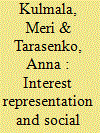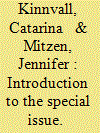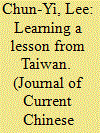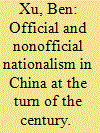|
|
|
Sort Order |
|
|
|
Items / Page
|
|
|
|
|
|
|
| Srl | Item |
| 1 |
ID:
155853


|
|
|
|
|
| Summary/Abstract |
Vladimir Putin’s long period in power has so far raised scant discussion about the political concepts that underpin real state and societal unity, and especially about the domestic political implications of these concepts. Despite this, key concepts of his political regime, such as ‘sovereignty’ and ‘sovereign democracy’, have frequently been used in Russian political discourse. This essay examines the way the current Russian administration has used concepts that stress strong societal unity, and the creation of a stable state and societal unity to support the development of real functioning dynamics in the society. It charts the shift from ‘sovereign democracy’ to ‘sovereignty’ around 2011–2012 as a key discursive concept in moving towards a more isolationist international stand and consolidating Putin’s power by emphasising Russia’s unique political tradition, which requires a strong leader as the basis of national unity and to ensure Russian sovereignty.
|
|
|
|
|
|
|
|
|
|
|
|
|
|
|
|
| 2 |
ID:
143807


|
|
|
|
|
| Summary/Abstract |
The essay investigates how Russian veterans’ organisations represent the concerns of their constituency vis-à-vis the Russian state. An interest group approach is applied to investigate the ‘brokering’ function exercised by veterans’ organisations to lobby on behalf of their constituency. The analysis is based on the study of selected veterans’ organisations in Karelia and St Petersburg. The research finds that veterans’ organisations operate in a restricted environment, though our analysis shows that their agency has mattered, largely due to their political connections. The investigation reveals those mechanisms through which Russian veterans’ organisations act as brokers.
|
|
|
|
|
|
|
|
|
|
|
|
|
|
|
|
| 3 |
ID:
151174


|
|
|
|
|
| Summary/Abstract |
The research community of ontological security scholars is vibrant and wide-ranging, defined by a conceptual core and by the themes through which scholars register their disagreements. In this special issue we have collected some of the work that has been produced or inspired by discussions and meetings during the last few years. The goal is to showcase some of the breadth of insights and possibilities on the topic of ontological securities and insecurities in world politics. Thus far, International Relations scholarship on ontological securities in world politics has been varied, focusing on different referent objects (individual, society, group, state), different political outcomes (cooperation, conflict, violence; stability or change) and different methods (quantitative, qualitative, discursive). While on the face of it such differences would seem to pose a challenge to the goal of developing a coherent research agenda, we have found the range of work and diversity among ontological security scholars to be exceptionally productive, leading already to cross-fertilisation and the deepening of our own approaches, while also inspiring new collaborations. The articles in this special issue discuss the subjective and foundational dimensions of ontological security in philosophical, existential and empirical terms and approach the ‘level-of-analysis’ problem from new perspectives.
|
|
|
|
|
|
|
|
|
|
|
|
|
|
|
|
| 4 |
ID:
134306


|
|
|
|
|
| Summary/Abstract |
This paper argues that the comparison of labour policies in Taiwan and China has an important bearing on the interaction between state and society. The fact that labour policies have changed over time illustrates a process of bargaining between the state and society. The core question of this paper is whether the development of labour policies in Taiwan can provide China a good example to learn from. In order to answer this question more systematically, the first part of this paper provides theoretical reviews of the state–society relationship, while the second part aims to verify whether those labour-favouring policies in Taiwan have changed under a different party’s governance. The third part of the paper further investigates labour policy in China; this section mainly focuses on the historical background to the new labour contract law. Based on the preceding two sections’ literature review of the changing path of labour policies, the fourth section scrutinises fundamental issues reflected in the development of Taiwan’s labour policies, then compares how those issues are reflected in the case of China. The conclusion of this paper is that although Taiwan, like China, formerly had a one-party system, the changes in Taiwan’s labour policies are not completely comparable to China, though both societies had some similarities.
|
|
|
|
|
|
|
|
|
|
|
|
|
|
|
|
| 5 |
ID:
078196


|
|
|
| 6 |
ID:
140788


|
|
|
|
|
| Summary/Abstract |
This article offers a first academic evaluation of the Special Demonstration Squad and the National Public Order Intelligence Unit, two British undercover police units working for the Metropolitan Police Service at different times between 1968 and 2011. It provides a historical overview of their infiltration of political groups involved in protest for the purpose of gathering criminal and political intelligence aimed at preventing violence, public disorder, and subversion. It discusses the controversies surrounding these units, and the related institutional responses, and offers an attempt at understanding their operations within the remit of intelligence-led policing and against a political culture that prioritizes action over inaction in reducing risks and threats to the State and society.
|
|
|
|
|
|
|
|
|
|
|
|
|
|
|
|
| 7 |
ID:
005250


|
|
|
|
|
| Publication |
New Delhi, Wiley Eastern Ltd., 1995.
|
| Description |
xxviii,516p.
|
|
|
|
|
|
|
|
|
|
|
|
Copies: C:1/I:0,R:0,Q:0
Circulation
| Accession# | Call# | Current Location | Status | Policy | Location |
| 036263 | 301/RED 036263 | Main | On Shelf | General | |
|
|
|
|
| 8 |
ID:
184084


|
|
|
|
|
| Summary/Abstract |
Whilst scholars have examined the long-term political, social, and cultural dynamics with regards to Yugoslavia’s collapse, the military has largely escaped similar scrutiny. This paper explores the League of Communists of Yugoslavia’s attempt to solve the nationalist problems of Yugoslavia through the ideology of self-management, and how the failure to do so affected the strategy of Total National Defence. The republics were able to construct their own armed forces due to Total National Defence’s devolution of powers and self-management making changes to the policy extremely difficult for the federal government and Yugoslav People’s Army.
|
|
|
|
|
|
|
|
|
|
|
|
|
|
|
|
| 9 |
ID:
130990


|
|
|
|
|
| Publication |
2014.
|
| Summary/Abstract |
The reconfiguration of the security landscape in recent years has resulted in the transformation of the relationship between the individual and the state. A catalyst toward this transformation has been the growing link between securitization and preemptive surveillance, and the focus of security governance on the assessment of risk (Amoore and de Goede 2008). Central in this context is the focus on the future, and the aim of preemptive surveillance to identify and predict risk and dangerousness (Bigo 2006). The preemptive turn in surveillance has been based largely upon the collection, processing, and exchange of personal data, which has in turn been marked by three key features. The first feature involves the purpose of data collection and processing. This is no longer focused solely on data to address the commission of specific, identified criminal offenses, but focuses rather on the use of personal data to predict risk and preempt future activity. The second feature involves the nature of the data in question. On the one hand, preemptive surveillance focuses increasingly on the collection of personal data generated by ordinary, everyday life activities. This includes records of financial transactions (Mitsilegas 2003; de Goede 2012), of airline travel (PNR) reservations (Mitsilegas 2005), and of mobile phone telecommunications (Mitsilegas 2009). The focus on monitoring everyday life results in mass surveillance, marked by the collection and storage of personal data in bulk. On the other hand, the focus on prediction and preemption has been linked with the deepening of surveillance via the collection of sensitive personal data from the human body, such as DNA samples and biometrics (Lyon 2001; Amoore 2006). The third feature of preemptive surveillance involves the actors of surveillance. A key element in this context, linked with the focus on the monitoring of everyday life, is the privatization of surveillance under what has been named a "responsibilisation strategy," aiming to co-opt the private sector in the fight against crime (Garland 1996). Thus, banks and other financial and non-financial institutions (including lawyers), airlines and mobile phone companies are legally obliged to collect, store, and reactively or proactively transfer personal data to state authorities. The privatization of surveillance has been accompanied by the expansion of state actors of surveillance. Maximum access to databases has been allowed to security agencies, notwithstanding the purpose of the database. A prime example in this context is access by law enforcement authorities to immigration databases such as the EU Visa Information System (Mitsilegas 2012) which reflects what has been deemed the (in)security continuum, transferring the illegitimacy of criminality to immigration (Bigo 1996).
|
|
|
|
|
|
|
|
|
|
|
|
|
|
|
|
|
|
|
|
|